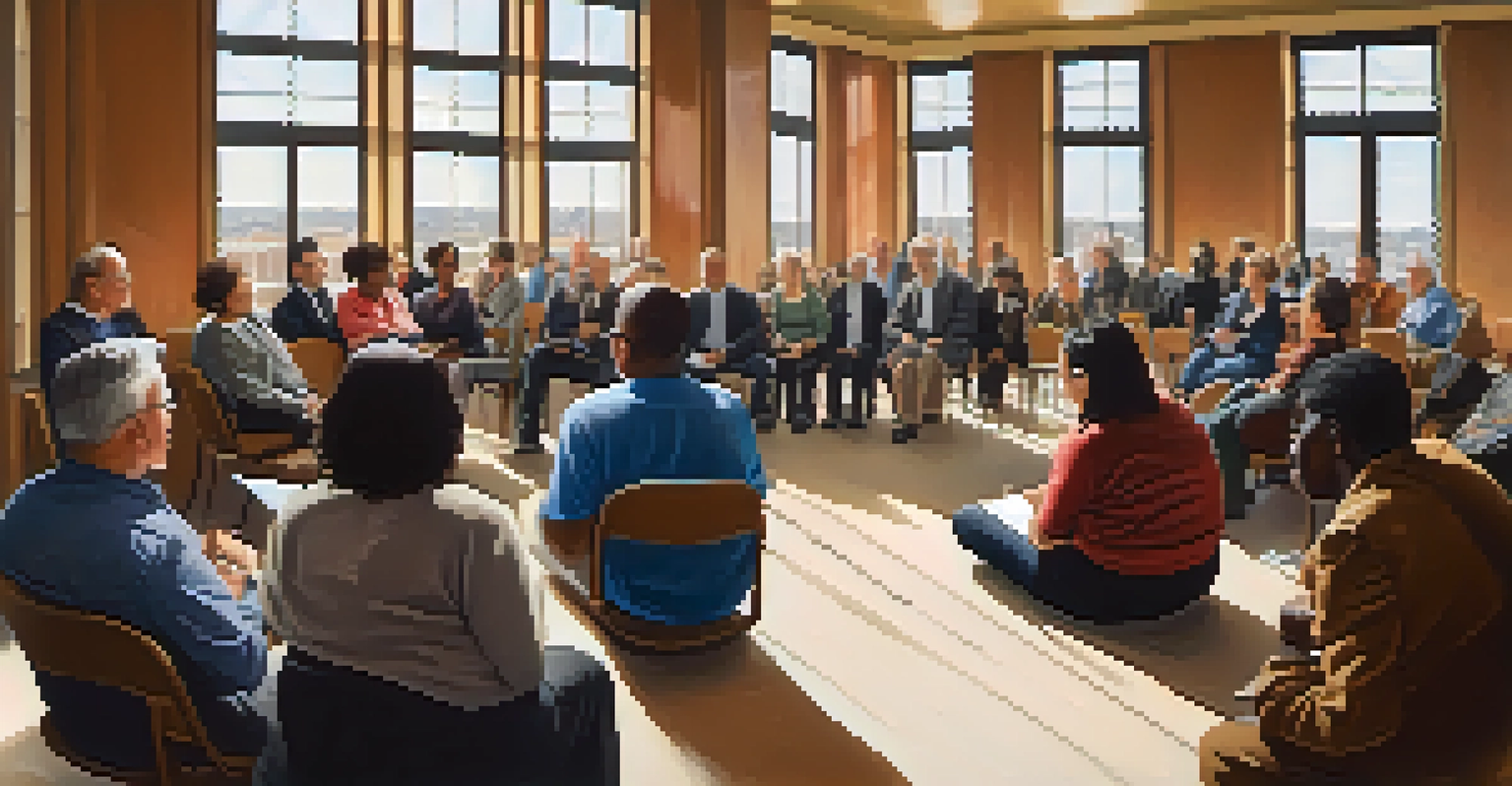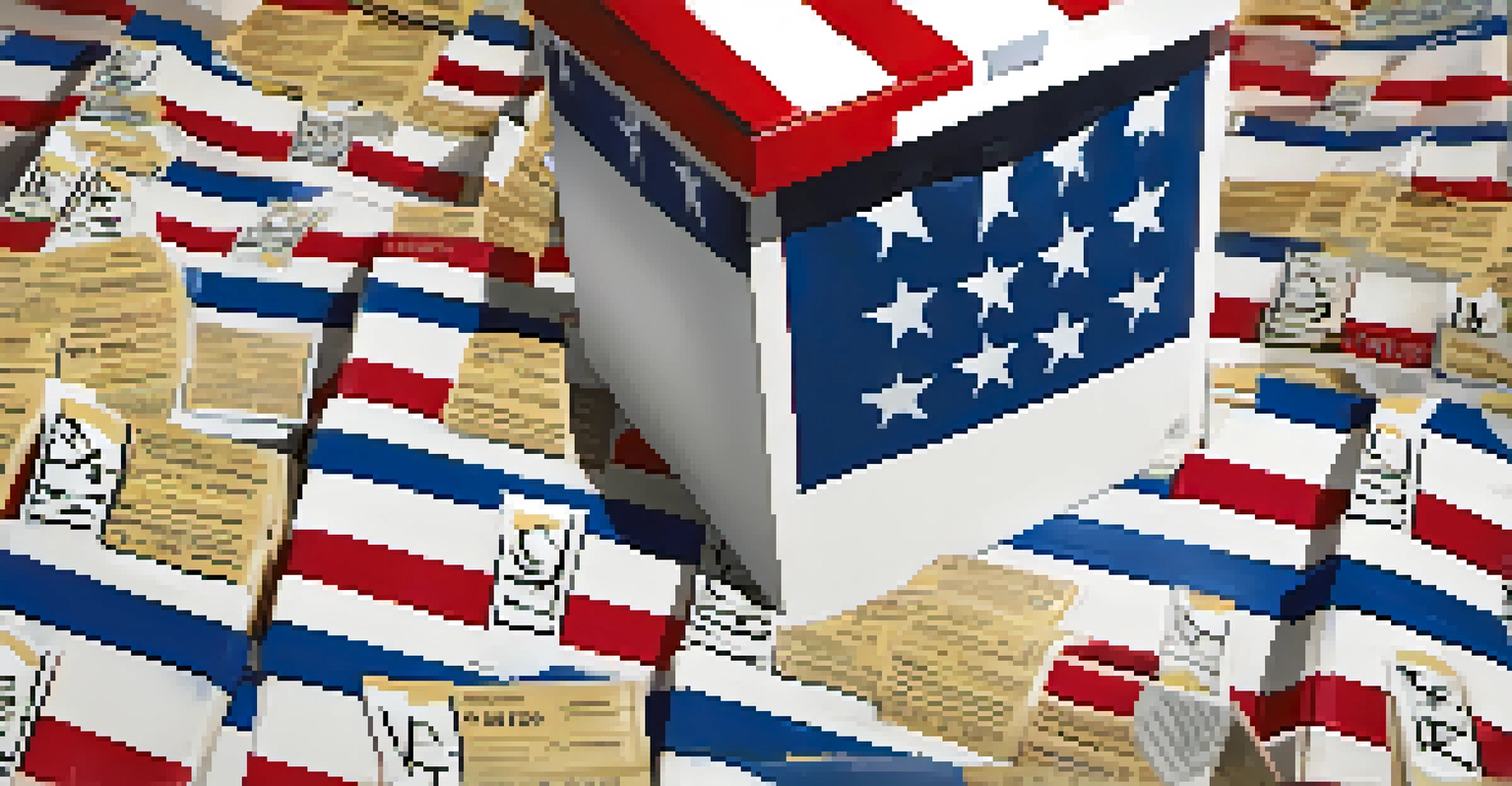Understanding Washington State's Political Structure and Governance

Overview of Washington State's Political System
Washington State employs a democratic system of governance, primarily focused on representing the will of the people. At its core, the political structure is built on a separation of powers among the executive, legislative, and judicial branches. This ensures that no single entity can dominate the political landscape, fostering a balance that is crucial for democracy.
The best way to predict the future is to create it.
The state's Constitution, adopted in 1889, lays the groundwork for this system, outlining the roles and responsibilities of each branch. It is worth noting that Washington's governance is influenced by its unique geography and cultural diversity, which shape legislative priorities and policy decisions. Understanding this context is essential for grasping how the state operates today.
Moreover, Washington has a history of progressive politics, often leading the nation in areas like environmental protection and social justice. This political climate reflects the values of its residents, who tend to prioritize community engagement and collective well-being over individual interests.
The Executive Branch: Roles and Responsibilities
The executive branch of Washington State is headed by the Governor, who plays a pivotal role in implementing state laws and overseeing the administration. Elected to a four-year term, the Governor is responsible for proposing budgets, appointing agency directors, and ensuring that state agencies function effectively. This role is vital, as the Governor shapes policy initiatives that impact millions of residents.

In addition to the Governor, the executive branch includes other statewide elected officials such as the Lieutenant Governor, Attorney General, and Treasurer. Each of these roles has distinct responsibilities that contribute to the overall governance of the state. For instance, the Attorney General serves as the chief legal advisor to the state, representing Washington in legal matters.
Washington's Democratic Governance
Washington State employs a democratic system that balances powers among the executive, legislative, and judicial branches to represent the people's will.
The Governor also has the power to veto legislation, which can significantly influence the legislative process. This authority allows the executive branch to act as a check on the legislature, ensuring that proposed laws align with the state's values and priorities.
The Legislative Branch: Structure and Function
Washington State's legislative branch is bicameral, consisting of the Senate and the House of Representatives. Together, these bodies create laws, approve budgets, and represent the interests of their constituents. Each district elects its own representatives, ensuring that diverse perspectives are included in the legislative process.
Democracy is not a static thing. It is a living process. Each generation must do its part.
The Senate has 49 members, while the House comprises 98 members, making for a dynamic and often contentious environment. The legislative session typically runs from January to April, during which lawmakers propose and debate bills that can address anything from education reform to healthcare policy. This period is crucial for shaping the future of the state.
Committees play a significant role in the legislative process, allowing for in-depth examination of proposed laws before they reach the floor for a vote. This structure helps to streamline discussions and ensures that all voices are heard, although it can also lead to partisan gridlock on contentious issues.
The Judicial Branch: Upholding Justice
The judicial branch of Washington State is responsible for interpreting laws and administering justice. This branch includes a system of courts, ranging from local courts to the Washington Supreme Court, the highest court in the state. By providing checks and balances, the judiciary ensures that laws are applied fairly and consistently across the state.
Judges in Washington are elected, which means that citizens have a direct say in who interprets their laws. This democratic approach aims to keep the judiciary accountable to the public, although it can sometimes lead to challenges, such as campaign financing issues. Nevertheless, the judiciary's independence is crucial for maintaining the rule of law.
Role of Local Governments
Local governments in Washington, including cities and counties, manage community-specific issues and services, empowering residents to engage with their representatives.
The Washington Supreme Court hears significant cases that often set precedents for lower courts. Issues related to civil rights, environmental law, and criminal justice frequently arise, underscoring the court's role in shaping state policy and protecting individual liberties.
Local Government: Cities, Counties, and Special Districts
Local government in Washington State is structured around cities, counties, and special districts, each with its own powers and responsibilities. Cities manage local affairs such as zoning, public safety, and public works, allowing for tailored governance that reflects community needs. Counties, on the other hand, handle broader services like health care, law enforcement, and social services.
Special districts serve specific functions, such as fire protection or public transportation, and operate independently from city or county governments. This layered approach to governance helps ensure that resources are allocated effectively and that local issues are addressed promptly. It also allows residents to engage directly with their local representatives.
The relationship between state and local governments is defined by the principle of home rule, which grants local entities the authority to govern themselves as long as they comply with state laws. This dynamic fosters innovation in local governance, enabling communities to experiment with solutions that best meet their unique challenges.
Political Parties and Elections in Washington State
Political parties play a crucial role in Washington State's governance, providing a framework for political participation and representation. The two major parties, the Democratic Party and the Republican Party, dominate the political landscape, although there are several smaller parties that contribute to the diversity of opinions. This multi-party system encourages robust debates on key issues affecting residents.
Elections in Washington are conducted using a top-two primary system, which allows the two candidates receiving the most votes in the primary to advance to the general election, regardless of party affiliation. This system aims to promote broader voter choice and encourage candidates to appeal to a wider audience, fostering a more inclusive political environment.
Impact of Political Parties
Political parties, particularly the Democratic and Republican parties, are crucial for fostering political participation and ensuring diverse representation in Washington State.
Voter engagement is a priority in Washington, with numerous initiatives designed to increase participation and turnout. From mail-in voting to same-day registration, the state employs various strategies to ensure that all residents can exercise their right to vote, reinforcing the democratic process.
The Role of Interest Groups and Lobbying
Interest groups and lobbyists play a significant role in shaping policy decisions in Washington State. These organizations advocate for specific causes, representing a wide range of interests, from environmental protection to business development. By influencing lawmakers, these groups help ensure that their perspectives are considered during the legislative process.
While lobbying can be viewed with skepticism, as it can lead to unequal representation, it also provides a means for citizens and organizations to voice their concerns. Many interest groups engage in grassroots efforts to mobilize public support, illustrating how collective action can lead to meaningful change in governance.

Transparency in lobbying activities is crucial for maintaining public trust. Washington State has established laws requiring lobbyists to register and disclose their activities, helping to ensure that the political process remains open and accountable to the citizens it serves.